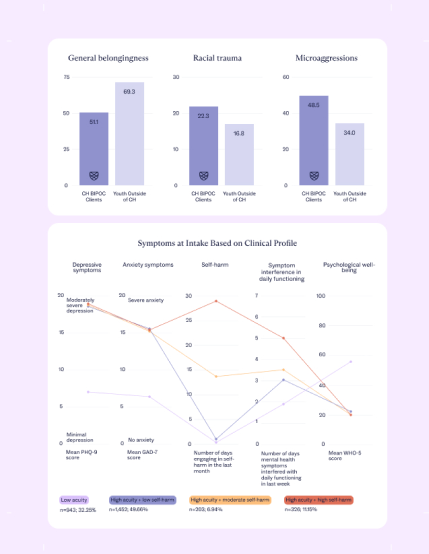Outcomes
Charlie Health is building data-driven solutions to connect the world to life-saving treatment
Who we serve
Our clients come to us with life-threatening symptoms
Nearly 50% have attempted suicide in their lifetime
3 in 4 have moderate or severe depression at intake
One-third of clients engage in self-harm in the month before starting Charlie Health
Two-thirds have moderate or severe anxiety at intake
Results
Industry-leading attendance
91%
Charlie Health session attendance
65%
Average IOP session attendance
Life-saving outcomes
93%
of clients reported improvements in symptoms associated with depression
90%
of clients reported improvements in symptoms associated with anxiety
89%
of clients reported improvements in self-harm
91%
of clients with substance use disorder reported improvements in symptoms associated with anxiety
Satisfaction rates that speak for themselves
92%
of clients and families would recommend Charlie Health to a friend or family member
96%
of families were satisfied with their loved one’s primary therapist
96%
of clients were satisfied with their primary therapist
The foundation of our care
We partner with leading universities and research institutions to publish our outcomes and drive our industry forward

Examining the Mental Health Symptoms of Neurodivergent Individuals Across Demographic and Identity Factors: A Quantitative Analysis
Measurement-Based Care in a Remote Intensive Outpatient Program: Pilot Implementation Initiative
The Positive Impact of Identity-Affirming Mental Health Treatment for Neurodivergent Individuals
Mental Health Outcomes for Youths With Public Versus Private Health Insurance Attending a Telehealth Intensive Outpatient Program: Quality Improvement Analysis
Reduction of Mental Health–Related Emergency Department Admissions for Youth and Young Adults Following a Remote Intensive Outpatient Program: Quality Improvement Analysis
Treating Depression in Adolescents and Young Adults Using Remote Intensive Outpatient Programs: Quality Improvement Assessment
The Impact of Family Therapy Participation on Youths and Young Adult Engagement and Retention in a Telehealth Intensive Outpatient Program: Quality Improvement Analysis
Lesbian, Gay, Bisexual, Transgender, Queer, Intersex, Asexual, and Other Minoritized Gender and Sexual Identities–Adapted Telehealth Intensive Outpatient Program for Youth and Young Adults: Subgroup Analysis of Acuity and Improvement Following Treatment
Understanding Treatment Needs of Youth in a Remote Intensive Outpatient Program Through Solicited Journals: Quality Improvement Analysis
Predicting Youth and Young Adult Treatment Engagement in a Transdiagnostic Remote Intensive Outpatient Program: Latent Profile Analysis
Comprehensive, personalized treatment from home.









